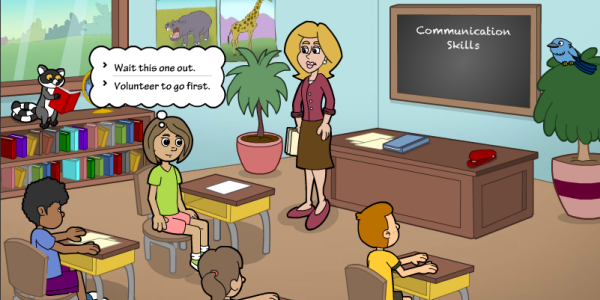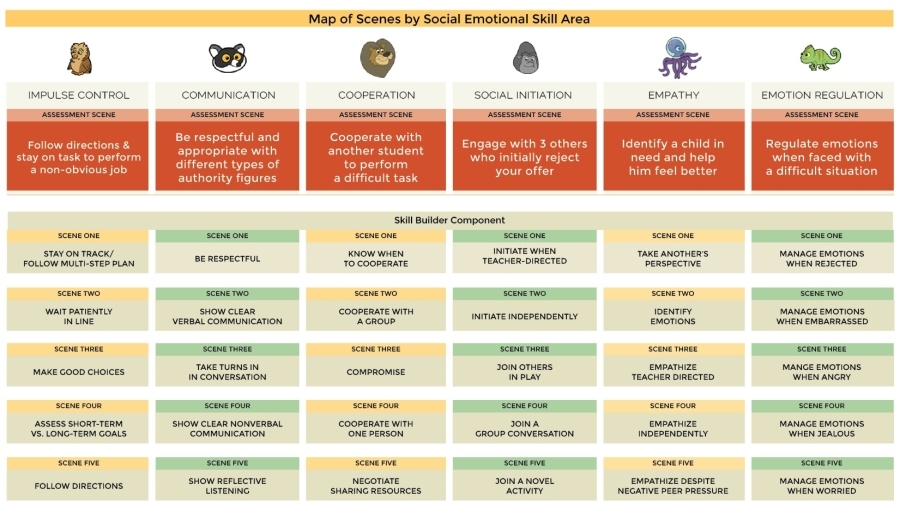Do video games inspire real world behavior?

Zoo U uses minigames and narrative scenarios to test students ability to react to emotions and understand social situations.
It’s a debate that usually centers on violence. Politicians, educators and parents have been arguing about whether playing violent video games translates into violent acts since at least 1993, after former Sen. Joe Lieberman chaired a Senate subcommittee on violent video games in response to arcade fighter Mortal Kombat’s “gruesome forms of cruelty.” That hearing and the threat of a possible government crackdown shook up the commercial games industry enough to inspire some self-regulation, including the creation of the modern game rating system, or Entertainment Software Rating Board.
School shootings have amplified the debate, but also inspired new conversations. Dr. Jeremy Richman, whose 6-year-old daughter was killed in the Newtown, Conn. school shooting, and Jessica Berlinski have argued that the link between violent games and real-world violence is murky at best and instead we should focus on how games are an ideal medium to build skills like empathy, communication and impulse control.
They are part of a growing effort to teach so-called Social and Emotional Learning, or SEL, in schools. In direct response to the mass killing of first graders and teachers at Sandy Hook Elementary School in 2012, one U.S. Senator from Connecticut is trying to pass a $2.5 billion federal funding bill to establish SEL programs in schools and to train teachers to help them identify symptoms of depression and anxiety among their students.
SEL as a Learning Tool
Berlinski and others argue that SEL is not just about reducing potential violence. They point to studies that show possible links between students with SEL savvy and increased academic performance in good old-fashioned reading, writing and arithmetic.

Jessica Berlinski
“The skills that kids need to succeed are moving away from knowledge-based and more into this 21st century social and emotional learning domain,” said Berlinski in a conversation with gamesandlearning.org. She’s now Chief Impact Officer for Personalized Learning Games, an educational game developer that recently released Zoo U, the first in a planned series designed to help kids build their SEL skills.
The Raleigh, N.C.-based company designed the game with K – 4-grade students in mind, and funded Zoo U’s $1.5 million budget, in large part, with help from a U.S. Department of Education SBIR grant, most of which went to facilitate research involving nearly 250 3- and 4-graders from 15 classrooms.
“Part of the reason these skills are becoming so important is they are being used to buttress academic achievement,” Burlinski said, who also co-founded a game-based, social and emotional learning company with Electronic Arts founder Trip Hawkins, and is also former managing director of the GameDesk Institute.
When I was a kid, knowledge was at a premium. Now I can google anything. It’s not difficult. It’s what you do with that knowledge that’s important. Can you persist through failure? Can you collaborate with others people and cultures?
— Jessica Berlinski, Chief Impact Officer, Personalized Learning
Zoo U’s Gameplay
The Zoo U environment is structured around a school populated not only with kids, but an interesting mix of colorful, anthropomorphic animal buddies — chameleons that snatch flies out of the air with their tongues, octopuses outfitted with fishbowl helmets filled with water to breathe, or elephants that poke their curious trunks through open classroom windows.
These animals hang out alongside more realistic designs of elementary school students, a Teddy Roosevelt-on-safari looking chap named Principal Wild and their teachers, all of whom interact within social skill-building episodes. In these scenes players must decided how to deal with threats from locker-leaning bullies in the hallway or feelings of rejection from being left out of an impromptu soccer game on the school yard. When the game asks the player, who can select a male or female avatar, how the rejection makes them feel, they choose from a series of facial expressions and body language rather than a simple “I’m disappointed but I’ll get over it” or “That makes me mad!” text-based choice.
“This stuff is pretty common place in school — kids being mean, and name-calling,” Berlinski said. “To have a safe place, a virtual environment where they can play out these scenarios and make good decisions, and sometimes bad decisions, we’re finding that kids gravitate to that.”
Depending on those responses, the player, may have the opportunity to play mini-games that reward players for correctly matching facial expressions with the appropriate emotion — matching bright, open eyes and friendly eyebrows on a purple racoon with the emotion “happy,” for example. Other games are more modest, simply requiring the player to correctly time a button-press on a slider to kick a soccer ball into a goal.
“Much of the learning in these scenes [happens] through making conversational and social interaction choices,” said Jim Thomas, chief technical officer for Personalized Learning Games.
Thomas, who also holds a doctorate in Computer Science, said the team’s mini-game design motivations were designed to keep a Zoo U player’s attention through the SEL sections by adding variety in the gameplay. “In general, we looked for scenes that had pedagogical goals that would map well onto unique new mechanics,” he said. “This was always decided through extensive dialogue between the scene authors, psychologists, artists, audio and game programmers. One of our key advantages is that we have all those capabilities in-house and we are small enough that these folks all sit near each other and collaborate all day long.”
Players earn gold coins not only for performing well in the social interactions, but also for sticking around afterwards and listening to the individualized feedback from Principal Wild.
“The coins mirror the student’s performance against the pedagogical goals for the scene,” Thomas said. “The system will not unlock the next scene in the sequence until students have achieved a minimal level of performance versus those goals, or until the student has played the scene three times without achieving those goals. This helps keeps students from racing through the game without taking the time to learn.”
Assessment
Before player’s get the chance to navigate these skill-building scenes, they must first complete initial assessment scenes across six social and emotional learning skills: communication, empathy, and others. Zoo U’s assessment phase is designed to establish an individual baseline for each student, so their experiences in skill-building scenes may differ from their classmates. This emphasis on individual experience carries over the skill-building scenes, which ramps up their difficulty whenever a student replays a scene.
Many ed developers recognize the inherent appeal a Common Core-aligned game has for educators, but Personalized Learning Games is really doubling-down on Zoo U’s assessment tool, making it the backbone of its pitch to potential school buyers, some of which are slowly beginning to expand their opinion of what games can contribute to their classrooms.
“If educators and administrators are being graded by the government on whether their district or school is making gains in math and reading, and they know — and we do know this — that kids who have high competency rates in these social and emotional learning skills have higher reading and math scores, then we need to pay attention to that. So we have a critical need to measure them and how they connect to academic gain,” Berlinski said.
Curious educators can instantly access feedback on any of their students on how they’re performing in any of the six SEL categories. If a student is struggling in a particular area, like empathy for their classmates, Zoo U will link an educator to lessons from a Personalized Learning Games library that teachers can include in their classroom cirriculae to build empathy.
The Criticism
Personalized Learning Games’ Berlinski is quick to point out that Zoo U and their future projects are not meant to replace or even rival the life lessons students learn in the real world. But some critics of digital technology’s increasing presence in daily life say no game, no matter how well-designed or intentioned, can replace a healthy family dynamic.
Berlinski says she’s heard a lot of these criticisms.
“‘Are we completely backwards here? We’re going to put a kid in front a screen to learn interpersonal skills? That makes no sense.’ We know real-world instruction, a caring instructor and deep relationships are the core to SEL, but games can buttress that work. One one way to do that is through personalized learning. It’s literally the teacher kind of saying, ‘Ok, I’m noticing that Joey is disruptive in class and could need some extra help.’ But there are also quiet kids that are missed, and it’s a struggle for counselors to explain to parents why their kids might need [social and emotional learning] intervention. They don’t have an objective measure that they can say, ‘Well actually we did this assessment, and this is why we felt Joey needed some extra practice in this area.’ Right now all they have is to say, ‘Well, Mrs. Smith thought so,’” Berlinski said.
Furthermore, Zoo U’s researchers say the game can actually identify potential bullies. Their data indicates 78-percent of students who scored poorly in the cooperation, impulse control and empathy assessment scenes, and consistently selected negative responses to questions were singled out as bullies by teachers.
Ashley Craig is a developmental psychologist and lead researcher for Zoo U. She says Zoo U’s assessment tools can also detect whether a student is just quick-clicking their way through scenes, skipping audio or listening to questions long enough to understand them, but educators should consider their students’ scores in great context.
“They should not be considered in place of more traditional psychological evaluations, but rather we hope that they serve as both a starting point and further corroborating evidence for educators and providers who have concerns about individual students or just want to be sure students without overt behavioral issues aren’t going unscreened for more subtle issues,” Craig said.
2015 will be a big year for Personalized Learning Games: They’re currently working on two additional versions of Zoo U to expand outside their original target age range (7- through 12-year-olds). They also plan to continue their research and court the interest of nearly 20 more school districts across the country, many of whom are waiting to see if Zoo U’s final research furthers their claims of SEL’s impact in the classroom. If it does, Connecticut legislators might be the first of many asking for federal funding to create their own SEL programs.
“Not enough people know about game-based assessment. It’s that simple. We have to educate people about the value of game-based assessment and game-based learning,” Berlinski said.

